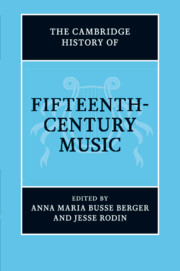Book contents
- The Cambridge History of Fifteenth-Century Music
- Series page
- The Cambridge History of Fifteenth-Century Music
- Copyright page
- Dedication
- Contents
- Figures
- Music examples
- Notes on contributors
- Acknowledgments
- Abbreviations
- Introduction
- Part I Historiography
- Part II Improvisation and composition
- Part III Humanism
- Part IV Music and other arts
- Part V Music in churches, courts, and cities
- 21 Musical institutions in the fifteenth century and their political contexts
- 22 Music and musicians at the Burgundian court in the fifteenth century
- 23 The papal chapel in the late fifteenth century
- 24 The beneficial system and fifteenth-century polyphony
- 25 Professional women singers in the fifteenth century: a tale of two Annas
- 26 Savonarola and the boys of Florence: songs and politics
- Part VI Religious devotion and liturgy
- Part VII Theory and practice
- Part VIII Sources
- Part IX Genres
- Part X Reception
- Index
21 - Musical institutions in the fifteenth century and their political contexts
from Part V - Music in churches, courts, and cities
Published online by Cambridge University Press: 05 July 2015
- The Cambridge History of Fifteenth-Century Music
- Series page
- The Cambridge History of Fifteenth-Century Music
- Copyright page
- Dedication
- Contents
- Figures
- Music examples
- Notes on contributors
- Acknowledgments
- Abbreviations
- Introduction
- Part I Historiography
- Part II Improvisation and composition
- Part III Humanism
- Part IV Music and other arts
- Part V Music in churches, courts, and cities
- 21 Musical institutions in the fifteenth century and their political contexts
- 22 Music and musicians at the Burgundian court in the fifteenth century
- 23 The papal chapel in the late fifteenth century
- 24 The beneficial system and fifteenth-century polyphony
- 25 Professional women singers in the fifteenth century: a tale of two Annas
- 26 Savonarola and the boys of Florence: songs and politics
- Part VI Religious devotion and liturgy
- Part VII Theory and practice
- Part VIII Sources
- Part IX Genres
- Part X Reception
- Index
Summary
Keywords
- Type
- Chapter
- Information
- The Cambridge History of Fifteenth-Century Music , pp. 403 - 426Publisher: Cambridge University PressPrint publication year: 2015



